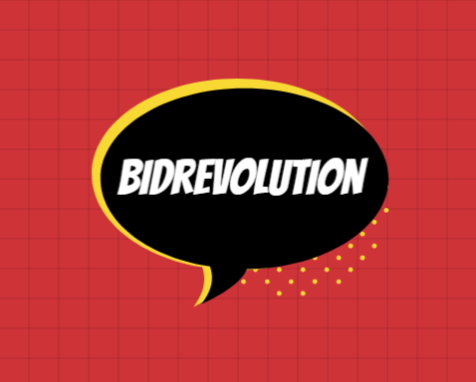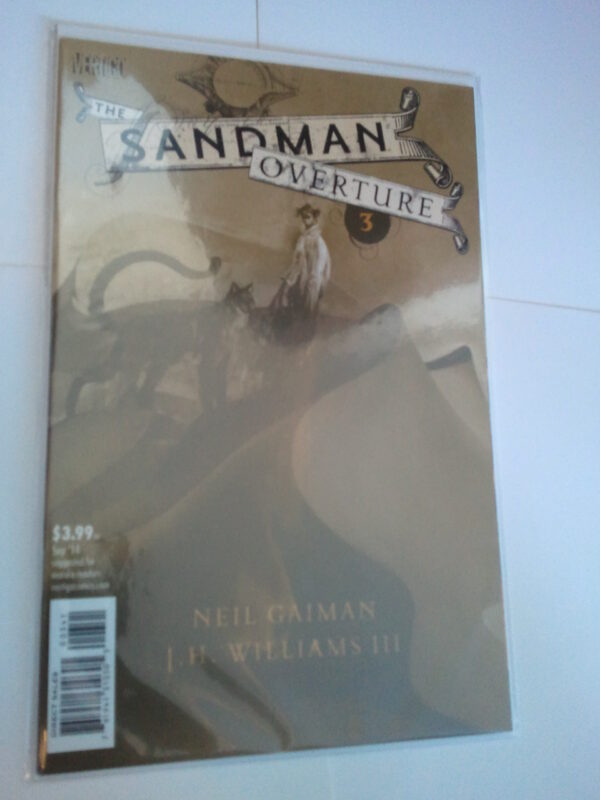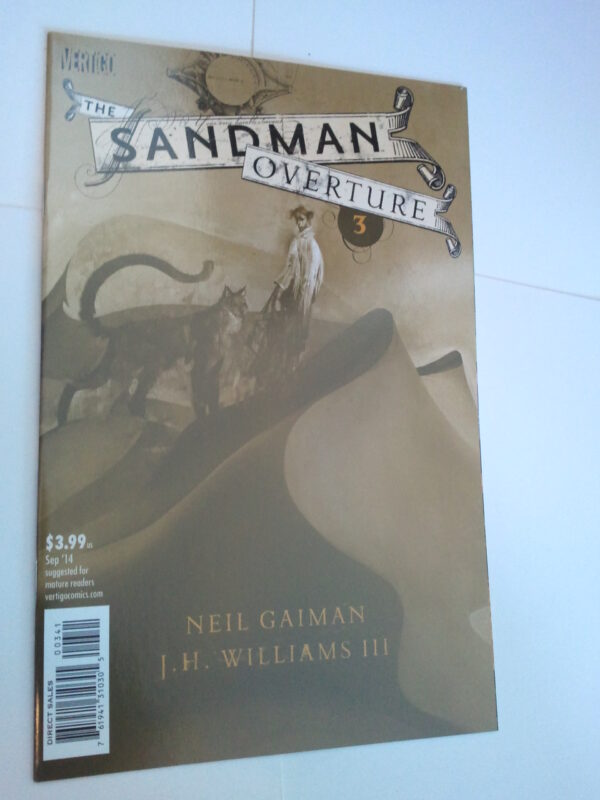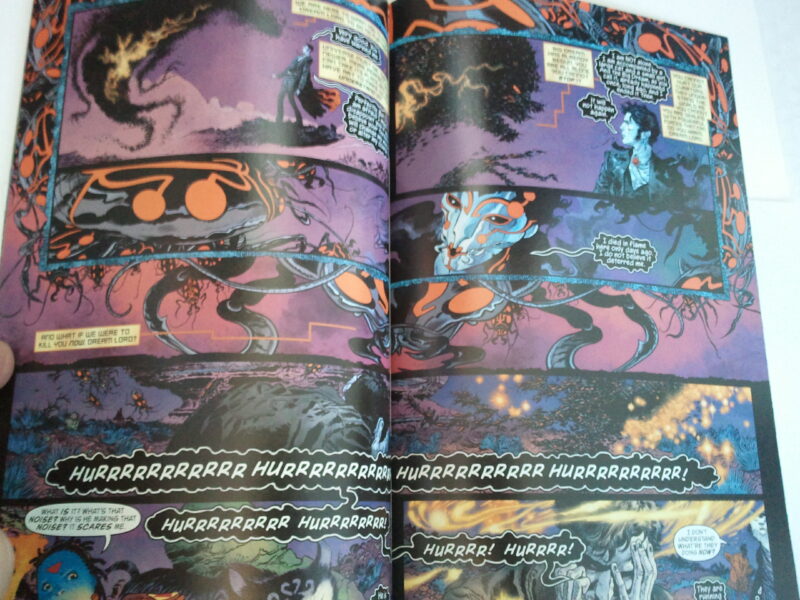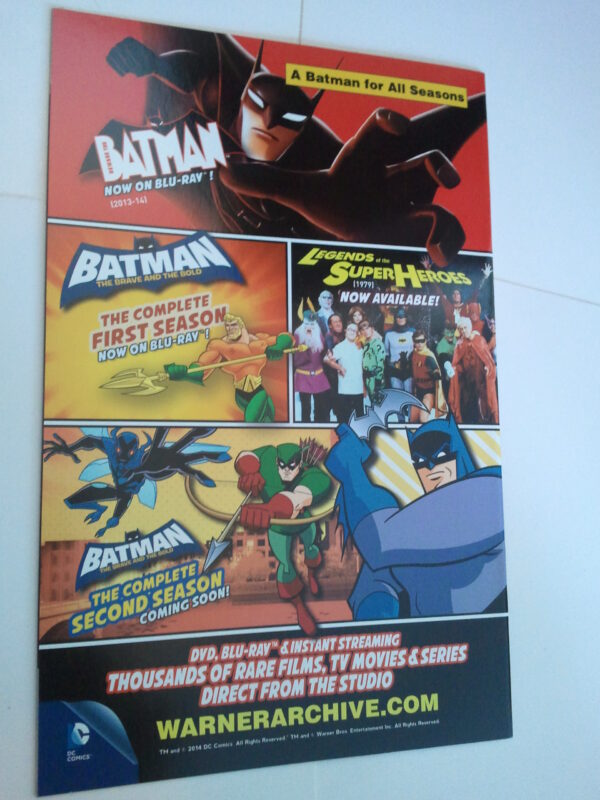Sandman Overture #3 NM Dave McKean 1:200 Special Ink Incentive Cover Netflix TV
$529.99
Description
Sandman Overture (2013) #3D
Published Sep 2014 by DC/Vertigo
Special Ink variant of Dave McKean’s cover for #3
Written by Neil Gaiman
Art by J. H. Williams
32 pages, Full color
The armies of the night are gathering. The universe is beginning its final dance. Morpheus, far from home, walks the path of madness, accompanied only by himself.
Featured Characters:
Dream (Morpheus) (Flashback and main story)
Desire/Dream of Cats (Flashback and main story)
Hope (First appearance)
The Hecateae
Green-skinned aliens
Metallic beetles
Delirium (Flashback only)
Alianora (Flashback only)
Diverse alien creatures and supernatural entities are becoming aware of the impending destruction of the universe. They are crossing the vastness of the cosmos, each with their own motivations, beliefs and intentions, and converging upon a single, unspecified point in space.
On their way to visit the “city of the stars”, Morpheus and the Dream of Cats arrive on a barren alien world, remeniscent of the American southwest. There they encounter the Hecateae, who try to convince Morpheus to barter with them for knowledge, leaving the Dream Cat as payment (mostly the Maiden’s idea.) They offer “teasers” of information, but as they do not seem to be telling him anything new, he declines to haggle with them and leaves. The Crone makes an ominous remark that he would be better off not looking “under the bed”.
Arriving at a ruined settlement, Dream and the cat encounter humanoid green-skinned aliens sporting hostile attitudes and firearms. Morpheus unsettles one of them by addressing him by name. The aliens begin shooting, although they are unable to actually inflict harm upon one of the Endless. Dream produces his pouch and throws sand at them; they collapse, incapacitated by nightmares.
The Dream of Cats points out that another alien — this one of a blue-skinned race — has been strung up inside one of the buildings, stripped naked and partially eviscerated, as if for food. Morpheus notes a child of the same race hiding under the bed and tells her to come out. The girl, Hope, is the daughter of the dead man and witnessed his murder.
Dream helps the girl bury her father. She declines Dream’s offer to wipe the trauma from her memory, relaying that the green marauders were aware of the coming apocalypse; cynically, they reasoned it was better for everyone to die quickly rather than sit around waiting for the end.
Morpheus initially declines Hope’s request to join them on their journey to visit the city of the stars, as she is too small and vulnerable and could not possibly keep up — also, as a mortal, not physically capable of entering the city. The Dream of Cats offers to carry her on his back.
Several days into the trip, the trio are set upon by a swarm of metallic beetles. They are referenced in the beginning of the issue as having intent to “participate in the destruction and make art from the wreckage”. Though Morpheus warns Hope to not harm even the smallest of them, the creatures attempt to overwhelm and intimidate him, even directly threatening his life. But at the terrifying sound of the dream-lord’s laughter the swarm flees, cowed.
Camping for the night, Dream begins to discuss his true nature with Hope; when he mentions one of his titles is Prince of Stories, she asks for his “best one”. So we finally hear the story of his ill-fated love affair with the creature Alianora, and how she got her facial scar; of the dream skerry, Hierogram and Porpentine later referenced in “A Game of You” (Sandman #32-37). The story also explains the origin of the Gates of Horn and Ivory, and of Dream’s Helm.
The first time I read a Sandman comic was a revelation. I had never read a comic so ambitious, so beautiful, and so damn deliciously dark. I was hooked and I was not alone. At that time the series had already been running strong for ten years, and every comic fan I knew cited it along works like Watchmen and Arkham Asylum as one of the key pieces that redefined their concept of what comic books could achieve. Being not only a huge fan of Sandman, but also of Gaiman’s work as a novelist, It was an absolute honor and privilege to have the opportunity to meet and speak with him about the return of Morpheus in the upcoming prequel The Sandman Overture.
Neil Gaiman and J.H. Williamson III met with the press to discuss the soon to be released comic. They talked about the return to the Sandman universe, their collaboration, how the fan base has grown over the years, the pressure of working for such a broad audience, creating a prequel to a work that spans four billion years, and more. Hit the jump to check out what they had to say and take a look at some art from the upcoming series.
Gaiman was first asked what it was like for him returning to the Sandman universe after all these years:
It’s really fun actually. It’s nerve wracking. It’s definitely a peculiar sense of terror. When I started doing sandman I didn’t know if anybody would be interested. I was basically writing it for me…and very quickly I found that I was writing for about 40,000 people and then I was writing 50,000 people and then 100,000 people. And that was still nice, that was still Okay. But there was a level at which you go, “the world population is huge and there’s 120,000 people who know about my comic” and that’s a tiny, tiny part of the population, but it made me happy. And even toward the end when we were outselling Batman and Superman, I was saying, “It’s only a little thing, and it’s nice.” And then a few years had gone by and the graphic novel collections have sold more and more with every year that’s gone by… I’ve asked DC how many copies we’ve actually sold, because we’ve got this figure of 7 Million that I’ve seen a few times, but I was saying, “Guys, those 7 Million graphic novel figure is the one that you rolled out in 2003.” And we’ve sold a lot of books since 2003. No one’s every actually sat down and counted all this and we don’t actually know how we’d count, because are you counting comics? Are you counting books? Are you counting collections? And none of us really know, but the upshot of all that is that 25 years after I started writing a comic that I didn’t know if anybody was going to read and that I thought would probably be cancelled at issue eight…that’s all changed. Now I’m doing it for millions of people and in my head they’re all looking over my shoulder as I write. And they’re all going, “this better be worth waiting for. This better be good.” And there’s millions of them.
Is it hard for Gaiman not to let that kind of audience pressure sway the way he tells the story?
It’s a little bit difficult. There was a point writing Sandman. It was about issue 8 that I had to make a big decision because the most popular thing I had done at that point was Sandman #4. People had loved going to hell they loved facing off against Lucifer…Fan mail on that was happy and thrilled, and I had a storyline that was going to be called Season of Mists and I knew that that was going to be Morpheus going to hell, facing off against Lucifer. It was going to be cool, fans were going to love it, and I thought “Okay I have a choice. I can do that story that everybody is going to love or I can do this thing in my head called The Dolls House and I don’t know if anybody is going to like that at all. It’s nothing like anything that’s been before…it’s different. And I went “Okay I’m going to do the thing that I don’t know if the fans are going to like and we’ll find out.” That’s what I did, and in some ways that became in some ways a kind of wonderful model for me for the rest of Sandman because it meant that I was actually allowed to do things that fans didn’t like.
He cited his work on The Kindly Ones as a primary example:
With The Kindly Ones I made some specific decisions including the fact that I’m not going to do those kind of elegant hidden recaps so when you pick up the issue having not read it for a month I’m going to reorient you to where we are in the story and I’m going to remind you because you haven’t read this thing in a month. Instead I’m just going to bang you straight on in…you lot are just going to have to cope with that. And I did The Kindly Ones and the reaction was, “This is the worst thing you’ve ever done.” And then I love the fact that the graphic novel format of The Kindly Ones gets the highest number of Amazon stars of any of the books. Because it works if you just sit and read it from beginning to end. The philosophy of Sandman has always been – you do the shit you think is right and hope that people go along with. Here I am 25 years later and that’s still the governing philosophy. I’m going to try and do the thing that is the right thing to do and tell my story and tell it honestly and try not to f it up and try not to blow any deadlines and try to give JH Williams amazing things to draw.
Williams is also feeling the pressure of expectation as he attempts the balancing act of honoring the Sandman universe that came before and bringing his own style to it:
That’s a very challenging thing for me and I am feeling the pressure, probably more so on myself than anyone else is putting on me because I want to do the series justice, I want to do Neil’s writing justice. It’s a weird thing because it’s a prequel, but at the same time in some ways it still needs to feel like now. So how do we walk the line of being a prequel, but still feeling relevant and fresh today on a visual level? That’s been very challenging, but I think so far we’re doing okay. As a creator and artist that’s definitely on my mind.
Gaiman spoke of why he chose Williams and their work together thus far:
I read Promethea and I loved it. So that was my first introduction…There was this one issue that was a Mobius strip where you were expected to cut out the pages and tape them together and you could have read them like that where I thought, “Okay, JH is actually as mad as Allan Moore” Allan gives him something impossible to do and he’s willing to go with it. For me the joy so far, it’s still early days for me and JH on this thing, is every time I ask him to do something impossible he does it.
For Williams the collaboration has been a great experience:
It’s been fantastic. He’s a very warm individual. The first time I got to speak to him on the phone we had a long conversation. I was so nervous because he was somebody I always looked up to and I was a great admirer or his work and he was so easy to talk to, so gracious, happy to have me on board and that made it really nice. We’ve been easy to connect right away.
When asked about his visual approach the Sandman world Williams said:
For lack of a better term it’s a bit sporadic because I’m trying to bring different qualities to each scene to make them distinct and with Sandman, since he’s the lord of dreams and it’s about stories and how stories can make you feel I want to make sure that each scene has this emotional beauty to it.
Was it difficult for Gaiman to reconnect with the story and maintain the same tone?
The characters are still there and the characters sound like themselves. They’re as much fun as they ever were…That’s the joy and that’s the challenge. Did you feel that the 42 Neil who wrote Endless Nights was writing the same characters as the 26 year old Neil who started writing them in Sandman #1? If you did then I think we have a good chance.
When asked what’s different about Morpheus as we see him in the past, Gaiman Joked:
Short hair.
Gaiman also commented on why he doesn’t see this as a true prequel:
The truth about Sandman is that in some ways when we wave the word prequel around we confuse the issue because Sandman, as a story, stretches from approximately four billion years ago…and it goes until approximately 2003-2004. In Sandman itself we go from mythical times, to Roman times, to the French Revolution – So it’s not like we have a time zone where we’re saying, “We’re going before that,” because we’ve already been before that. What we’re doing here is simply telling a story that happens in 1916 and some parts of the story happen outside of 1916…so I don’t think of it as a prequel. I just think of it as that Sandman story that I would have love to have told that just didn’t fit into Sandman 1-75.
Everyone on board seems confident and happy to be there, and considering the knockout year Gaiman is having so far, I’m feeling pretty hopeful that The Sandman Overture will be a killer addition to the world that fans have come to know and love.
The Sandman has an impressive cast made up of both big names and relative unknowns. Tom Sturridge will be playing the lead role of Dream, and he looks perfect for the part: pale, mysterious and kind of grumpy. He’s one of the lesser-known cast members. Bigger names include Charles Dance (Tywin Lannister from Game of Thrones), who plays an occultist who traps Dream for decades; Gwendoline Christie (Brienne of Tarth from Game of Thrones), who plays Lucifer; and comedic treasure Stephen Fry, among others.
The Sandman is an upcoming British-American fantasy streaming television series based on the 1989–1996 comic book written by Neil Gaiman and published by DC Comics. The series was developed by Allan Heinberg for the streaming service Netflix—with Heinberg, Gaiman, and David S. Goyer serving as executive producers—and is being produced by DC Entertainment and Warner Bros. Television. Like the comic, The Sandman tells the story of Dream, the titular Sandman. It stars Tom Sturridge as Dream, with Gwendoline Christie, Vivienne Acheampong, Boyd Holbrook, Charles Dance, Asim Chaudhry, and Sanjeev Bhaskar in supporting roles.
Efforts to adapt The Sandman to film began in 1991 and floundered in development hell for many years. In 2013, Goyer pitched a film adaptation of the series to Warner Bros. Goyer and Gaiman were set to produce alongside Joseph Gordon-Levitt, who was planned to star and possibly direct. However, Gordon-Levitt exited over creative differences in 2016. Due to the prolonged development of the film, Warner Bros. shifted its focus to television. Netflix signed a deal to produce the series in June 2019, and filming lasted from October 2020 to August 2021.
The Sandman star teases the show’s “extraordinary” scale
Neil Gaiman’s The Sandman is one of the most ambitious comics ever created. It’s a sprawling epic taking place across space and time that explores various cultures, myths and legend. For decades, the series has been deemed unfilmable, and while there have been failed attempts, it’s finally getting the live-action adaptation it deserves thanks to Netflix. The streamer is sparing no expenses; it’s the most expensive DC Entertainment TV show of all time!
According to star Sanjeev Bhaskar (who plays Cain, based on the biblical figure), the scale of the show is nothing short of “extraordinary,” unlike anything he’s seen. “I’ve only got a couple of scenes in The Sandman, but I have not worked on anything of that kind of scale before,” the actor told Radio Times. “We shot one day in the studio and a couple of days on location, and in the studio the sets they were building – just walking around, I’d never seen anything like it.”
It was just extraordinary in terms of scale, in terms of the detail, in terms of just how true to the comics, you know, to the spirit of the comics they’re trying to be…From the physical craftsmanship of carpenters and metal workers and electricians and everything, through to the fellow actors and the directors. I’m pretty excited about it.
Neil Gaiman had a similar reaction when he walked around the vast set in a behind-the-scenes teaser released last year: “Holy Sht.”
Back to Bhaskar, the actor also talked about the fan base. “I mean, I didn’t know much about Sandman before I got involved, and so it was only when I was announced as being part of it on Twitter that I kind of realized quite how deep and broad the fanbase is,” he said.
Before The Sandman, Bhaskar had a bit role on another Neil Gaiman show: Good Omens. “I’ve kind of known him on and off about 10 years,” he said. “And I just love this stuff. There’s a quirkiness to it which I think makes it quite uniquely British, in that you’ve got these fantastical stories that go into these other realms, but there’s a kind of thread of humour through all of them.”
Bhaskar will bring his comedy chops to the role of Cain, who continually kills his brother Abel in numerous brutal ways. It’s funny in a dark, bleak sort of way.
Neil Gaiman teases more Sandman announcements!
Sandman fans have been craving more news for months now, to no avail. And despite creator Neil Gaiman having very little authority in regard to how Netflix decides to market its shows, he recently shared that he’s had a word with the streamer about pushing some announcements forward. Whether this makes a difference, we’ll have to wait and see, but it shows Netflix that there’s a huge audience of eager fans, at least:
Ishu
Fandom have lost or finished with the contents and now taking junk for the months, what could be possibly go wrong just announcing the dates or giving a poster to discuss , I know it’s not in Neil’s hand but atleast he can provide us any thing or ask Netflix to do so.
Neil Gaiman
@neilhimself
Whoa. Okay, it was going to all be going out on Netflix’s schedule, but I’ve read your tweets and asked Netflix if they can move the announcements up a bit. 3:38 PM · Feb 2, 2022
…or he was joking.
Currently, Netflix does not yet have a premiere date set for The Sandman. As it stands, filming is complete and the series is in post-production. Let’s hope we get more info soon!
Near mint, 1st print. Bagged & Boarded.
Related products
-

Witchblade Tomb Raider 1 Crossover DF Cvr Mark Millar Geoff Johns Jae Lee Mark T
$49.99 Add to cart -
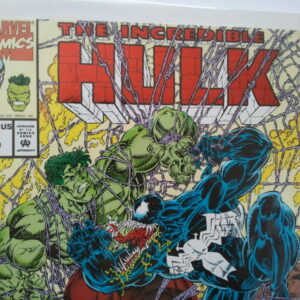
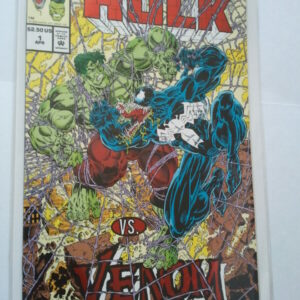
Incredible Hulk vs Venom 1 NM Peter David 1st print
$189.99 Add to cart -
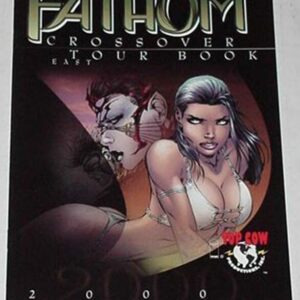
Fathom Crossover East Tomb Raider Witchblade Michael Turner Art Aspen Movie
$49.99 Add to cart -


X-Files 12 NM 2016 Subscription Cover Photo IDW Joe Harris 1st print Skinner
$59.99 Add to cart
